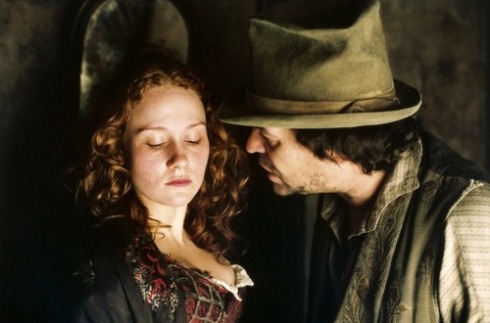Tags
Dickens, Gold Rush, Les Demoiselles d"Avignon, Manet's Olympia, Marie-Anne Mancio, Oliver Twist, prost, Urania Cottage, Whorticulture
Our culture has a bizarre relationship with prostitution. Prostitutes modeled for painters (e.g. Fillide Melandroni for Caravaggio) when ‘respectable’ women couldn’t; they were the subject of avant-garde works (Manet’s Olympia, Picasso’s Les Demoiselles d’Avignon) and operas (Verdi’s La Traviata). In literature, Maupassant’s short stories and Capote’s Breakfast at Tiffany’s are among the more convincing depictions. But arguably the most enduring stereotype is Dickens’ poor, abused Nancy of Oliver Twist.
Like many, Dickens had his own experience with prostitutes, albeit philanthropic. Maybe I’m being unfair, but his charitable attempts to rescue “fallen” women seem hypocritical given the shabby way he treated his own wife. Admittedly, when he co-founded Urania Cottage, an asylum for repentant prostitutes, he seemed to favor a less punitive regime than his contemporaries but the goal was the same: send the whores to Australia to start new lives as wives or servants.
Dickens claimed this paternalistic venture was a success but his letters also lament his “failures”. There’s Jemima Hiscock who “forced open the door of the little beer cellar with knives and got dead drunk. . . “; Sarah Hyam, found in the parlor in the early hours with the police constable who was supposed to be guarding the home; three women on route to Australia who ”lapsed” on the boat on the way over… As a writer, these women sound far more interesting to me than Dickens’ pitiful victims or gratefully reformed types.
In the early days of the Californian Gold Rush (when part of my novel is set) it was thought the west needed the civilizing influence of females. Encouraged to migrate, women soon realized the advantages of being in demand. Some furnished miners with bed and board, or opened laundries, or made pies. Others set up as prostitutes outside the mining camps (in the heyday of the Gold Rush, it was said they could earn a year’s wages in one night). Even respectable women put a price on their company, advertising themselves as potential wives, some refusing to settle for less than $20,000. Married women divorced whenever a better prospect came along. One question I asked myself was: were those wives as much prostitutes as the many women who worked in the San Francisco saloons and brothels?
I’m always interested in how the historical can illuminate the present and these ambiguities persist in the 21st Century. I’m sure The Real House Wives of … would be furious to be likened to whores or their husbands to johns, but the basis of some of their exchanges seems remarkably similar, (if less honest): he gives her an expensive diamond-encrusted watch; she rewards him with sex. There are many other contemporary parallels with situations in Whorticulture. We have websites that enable “sugar babes” to find “sugar daddies”; a woman can auction her virginity on eBay.
The narrative here is that some women choose, actively choose rather than are duped into/abused/trafficked into etc. prostitution. Because though society and, sadly, much feminism, is still reluctant to believe that women can make such a choice willingly and intelligently after weighing up the alternatives, history tells us otherwise. What I hope Whorticulture does is to illuminate some of the social and economic conditions that women faced in 19th Century America and the choices available to them. And leave it to the reader to think about what they would do in my characters’ place….






